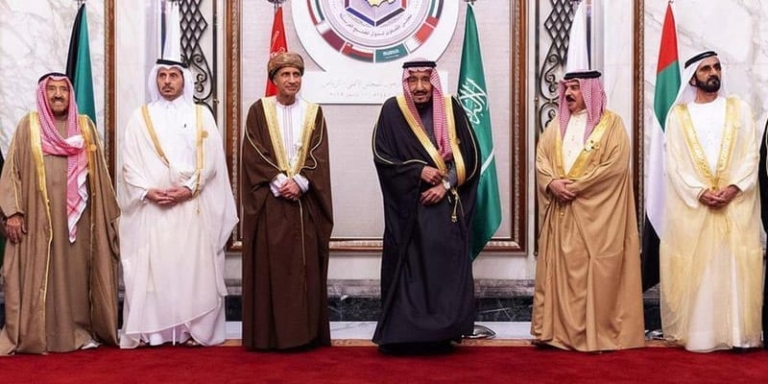
June 5th marks the third anniversary of the Gulf crisis when Saudi Arabia, the United Arab Emirates (UAE), and Bahrain were joined by Egypt in imposing a land, sea, and air blockade on Qatar. They accused Doha of working against Gulf Cooperation Council (GCC) common interests, destabilizing GCC states, and colluding with Iran, among other things. It is noteworthy that Kuwait and Oman refused to take sides in the dispute. The 2017 crisis remains one of the most serious challenges to the GCC states’ common interests and cohesion and their collective security and stability. Indeed, the continuing impasse has called into question the very idea of a supranational entity, akin to the European Union, through which the peoples of the six countries of the GCC could realize political, economic, social, and cultural goals.
That the GCC crisis continues today despite its detrimental effects speaks to the structural deficiencies the Gulf states’ entente had faced since its establishment in May 1981. Relying on the personalism that is essential for leader-to-leader relations, the council never developed institutional mechanisms for conflict mitigation or management, a condition that has resulted in the perpetuation of the current dispute. What also ails the GCC is an overwhelming tendency by larger and more powerful states to try to anoint themselves as its undisputed leaders. Such has been the origin of the crisis when Saudi Arabia and the UAE wanted to impose a set of conditions on Qatar that, for all practical purposes, would have forced Doha to relinquish its ability to decide its own domestic and external affairs. This continues to be the case as the two insist that Qatar has to abide by certain conditions in order for them to accept an accommodation that presumably would end the crisis.
Arab Center Washington DC (ACW) has asked a group of its fellows and outside experts to address and analyze the status of the GCC crisis today. Their analyses and perspectives are presented below.
What is at stake in reviving the Gulf crisis today?
Courtney Freer, Research Fellow, London School of Economics Middle East Center
As we arrive at the third anniversary of the Gulf crisis, a new normal has emerged. Within the GCC, Qatar has successfully adapted to the blockade with new trading partners; Bahrain, Egypt, Saudi Arabia, and the UAE persist in fostering their alliance and adopting similar foreign policies. Kuwait continues its efforts to mediate, with recent reports claiming that the Kuwaiti foreign minister, Ahmed Nasser Al Sabah, is seeking to convince Qatar to remain a member of the GCC. In short, a mutually harmful stalemate has now emerged. Nonetheless, this new status quo has major economic, political, and social implications for what is at stake.
The rift has become so entrenched that it is now even being exported to new areas beyond the GCC, like Libya, Sudan, and throughout the Horn of Africa, with different sides of the blockade supporting rival actors and racing to make competing investments. Backing actors who oppose Islamists and Islamism has become a hallmark not only of Bahraini, Egyptian, Emirati, and Saudi domestic policies—given the role these actors played as members of the political opposition during the Arab Spring—but of their foreign policies as well. Pitting two world views against each other, one that considers Islamism an existential threat (Bahrain, Egypt, Saudi Arabia, and the UAE, along with the Trump Administration, at times) and the other that sees Islamists as potential partners (Qatar and Turkey), this division now goes far beyond the GCC and has major regional and global implications.
Another way in which the rupture has been exported abroad is through coordinated campaigns of disinformation. Indeed, it seems that the hacking of the Qatar News Agency in May 2017, which began the rift itself, was only the beginning of such campaigns of hacking and circulating false information that continue to this day, making it difficult to know what is actually happening in the GCC. Rumors of a coup in Qatar are the most recent example of the use of traditional media outlets and social media to propagate disinformation, but there have been many over the past three years, ranging from the early rumors of a Qatari opposition gathering in London to the more recent and more credible reports of a possible détente in November of last year. This lack of clarity has only made the division increasingly entrenched beyond the GCC: depending on which news sources and Twitter pundits people follow, they get a very different view of the crisis and of the actors involved in it, increasing polarization, and the perception (and perhaps reality) of political instability, thus making resolution ever more unlikely.
Because the GCC rift now involves many more actors than just those blockading members of the GCC and Egypt, regional order could potentially be at stake. The future of the GCC as an entity remains highly uncertain. The entire incident also calls into question the efficacy of regional organizations across the Arab world, given that the action of blockading Qatar appears now to have become normalized without any organized attempts at finding a resolution. Further, the role of the United States under President Donald Trump and his administration has waned, one which initially favored the Saudi position then increasingly stepped back from the issue given vast US interests on both sides. There is therefore no longer effective US policing of regional actions or checks placed on aggressive activities therein, and this could have major consequences in the years to come.
What are the effects of the GCC crisis on today’s conditions in the Gulf?
Kristian Coates Ulrichsen, Non-resident Senior Fellow, ACW
The unprecedented economic and social dislocation caused by the COVID-19 pandemic means that the backdrop to the third anniversary of the Gulf crisis, occasioned by the launching of the blockade of Qatar on June 5, 2017, is unique compared with the first and second anniversaries in 2018 and 2019. And yet, the Gulf crisis endures while instances of rapprochement in other areas, such as between the UAE (and, to a lesser extent, Saudi Arabia) and Iran have not been replicated. The result is a continuing stalemate in which none of the parties appears willing to make the first move or concession that could kick-start stalled attempts to mediate or even negotiate among the disputants.
The failure of the dialogue that began in late 2019 between Saudi and Qatari officials offers an indication of where the obstacles to a resolution of the Gulf crisis may lie. There was some optimism in October and November––in the aftermath of the Iran-linked attack on Saudi oil infrastructure at Abqaiq and Khurais and Qatar’s role in affirming the principle of collective security among GCC states––that the dialogue would result in a breakthrough, or at least a thaw, in bilateral Saudi-Qatari ties. Certainly, the optics of the warm reception of Qatar’s then-Prime Minister Abdullah bin Nasser Al Thani at the GCC annual summit in Riyadh in December 2019 were very different from the frostiness with which he had been received just six months earlier at the trio of Gulf, Arab, and Islamic summits the Saudis had organized in Mecca in May 2018. In addition, the goodwill generated by the 24th Arabian Gulf Cup soccer tournament, which took place in Doha in November 2019, also sparked hopes that the blockade would begin to ease.
However, the goodwill of the fall did not yield results. In January 2020, Qatari Foreign Minister Mohammed bin Abdulrahman Al Thani announced that the talks had stalled and, effectively, were suspended. It appears that the Saudi mood shifted considerably after Crown Prince Mohammed bin Salman (MbS) visited Abu Dhabi in late November 2019 for the Abu Dhabi Grand Prix motor race and the second meeting of the Saudi-Emirati Coordination Council, of which he is co-chair along with Abu Dhabi’s Crown Prince Mohammed bin Zayed (MbZ). Whatever was said at the meetings between the two crown princes is not in the public domain, but observers in Doha were quick to note that the Saudi tone vis-à-vis a thaw in relations with Qatar became cooler afterward.
From the point of view of Doha, it would have been a considerable achievement if they could have split the quartet by peeling Saudi Arabia away from the blockade in November-December 2019. Such is the kingdom’s regional significance that Bahrain and Egypt may have followed suit, leaving the UAE (and, in practice, Abu Dhabi) isolated as the only holdout. That this did not ultimately happen is testament to the bond that remains between MbZ and MbS and the likelihood that the two crown princes do not view the blockade as an issue between them that is worth a falling-out.
As the blockade enters its fourth year it is assuming aspects of permanence, which neither the appointment of a new GCC secretary-general from Kuwait nor the sudden onset of COVID-19 has yet been able to affect. The fact that MbZ was willing to telephone Syria’s President Bashar al-Assad on March 27 to talk about the pandemic, but remains unwilling to do the same with Qatari leaders, spoke volumes. Just as the missile and drone attack on Saudi Arabia in September 2019 should have made clear that the threat to Saudi Arabia (and the UAE) does not come from Qatar, so the pandemic should have made it obvious that there are issues that transcend political and geopolitical rifts. As yet, however, that has not translated into any substantive policy changes on the ground.
What has become of Kuwaiti mediation efforts to resolve the Gulf crisis?
Marwan Kabalan, Director of Policy Analysis, Arab Center for Research and Policy Studies
Three years of tireless efforts to bring about a diplomatic solution to the most serious crisis in the history of the GGC have not produced any tangible result for Kuwaiti mediators. In 2019, Kuwaiti mediation efforts came close to success on two separate occasions. The first was in May, when Qatar’s prime minister attended the GCC, Arab, and Islamic summits in Mecca, Saudi Arabia, to show solidarity with the kingdom following several attacks on oil tankers in the Gulf and the Gulf of Oman. The second occasion was when the Gulf blockading countries (Bahrain, Saudi Arabia, and the United Arab Emirates) participated in the 24th Arabian Gulf Cup soccer tournament that took place in Doha in November 2019. The surprising decision raised hopes of a possible end to the Gulf stalemate. Around the same time, it was disclosed that Qatar’s foreign minister paid a visit to Riyadh and that an end to the crisis was nearing. All these hopes proved baseless, however: three years on, a resolution of the crisis remains as distant as it was on day one.
Some Gulf analysts blame the UAE for the lack of progress, arguing that Abu Dhabi is holding the Saudis back from accepting a settlement to the crisis. Indeed, Abu Dhabi is particularly inflexible when it comes to reconciliation with Qatar; but this alone does not explain why the Kuwaitis, with their vast experience in dealing with intra-Gulf disputes, so far have failed to make any progress in their mediation efforts. The explanation more likely lies in the fact that GCC countries no longer share the same threat perceptions, values, and foreign policy objectives.
In 1981, when Sheikh Jaber al-Ahmad Al Sabah, the late ruler and brother of the current emir of Kuwait, called for the establishment of an Arab Gulf collective security organization, there was an agreement among the six member states that revolutionary Iran represented an existential threat for the pro-US Gulf monarchies. That seems to have changed now. The revelation by the current emir of Kuwait, Sabah al-Ahmad al-Jaber Al Sabah, that his good offices had prevented military action against Qatar in the summer of 2017 left no doubt about this. It was the first time that a full military invasion seemed to have been contemplated by members of the GCC against another member, and in coordination with a non-member state (Egypt).
Since its beginning, the Gulf crisis has served to refute the existence of a collective security regime among the GCC states. They share neither similar values nor common interests. Their conflict also conceals different leadership visions about the future of the region. Although it is not a democracy, Qatar challenges the status quo and supports the cause of democracy across the Arab world, mainly through Al Jazeera. This goes against the very logic of the GCC, a club of rich, conservative, and non-democratic countries.
Qatar and Al Jazeera were blamed for the 2011 Arab revolutions that caused the fall of the Mubarak regime. With Mubarak out of the picture, Qatar was perceived to have succeeded in challenging the status quo and in engineering a new Middle East security architecture. Saudi Arabia and the UAE could not tolerate such a scenario; they supported and funded the July 2013 military coup in Egypt that deposed the democratically elected president, Mohamed Morsi, and reinstated the old regime, but without Hosni Mubarak. The coup exposed the rift between the GCC countries, leading to the 2014 crisis, when Saudi Arabia, the UAE, and Bahrain withdrew their ambassadors from Doha.
Lack of support by the Obama Administration prevented Saudi Arabia and the UAE from taking further measures against Qatar, but the election of President Donald Trump created the right environment for an alliance between the crown princes, MbZ and MbS, to address some unfinished business with Qatar. As a result, Qatar was pushed closer to Iran and Turkey and away from its fellow Gulf Arab countries.
Three years into the crisis, the GCC seems to have lost the very foundations of its existence. With no shared values or common interests and without agreement on threat perceptions, there seems to be very little impetus left for the block to remain. Kuwaiti mediators know this very well but cannot admit it since the GCC itself was their own idea in the first place.
Why is Egypt a party to the Gulf crisis?
Khalil al-Anani, Senior Fellow, ACW
Egypt’s continuing participation in the blockade of Qatar came as no surprise. Since the coup of 2013, which removed the Muslim Brotherhood from power in Egypt, relations between Cairo and Doha have been at their lowest point. While some observers might argue that Egypt joined the blockade of Qatar in order to please and support its financial backers, particularly Saudi Arabia and the UAE, Cairo had its own reasons to do so. First, President Abdel-Fattah el-Sisi, who led the coup against the Muslim Brotherhood and toppled Mohamed Morsi, Egypt’s first freely and democratically elected president, has been displeased with Qatar’s support for the Arab Spring, which he blames for the problems Egypt has had since the January uprising of 2011. Second, Sisi has repeatedly denounced Al Jazeera’s coverage of events in Egypt as he believes it is biased against his country and considers it as a part of the “fourth generation wars,” which, in essence, are asymmetrical wars that involve civilians. Third, and importantly, Sisi is distraught by Qatar’s embrace of Islamists, particularly of his main political enemy, the Muslim Brotherhood. Like many Egyptians, Sisi believes that the Brotherhood is an agent of Qatar and Turkey; therefore, its members and foreign supporters should not be tolerated.
To be sure, Egypt’s relationship with Qatar was marred by tensions and animosity prior to the January 2011 uprising. Former President Hosni Mubarak had criticized Qatar’s foreign policy and its expanding role in the Arab world particularly with regard to the Palestinian issue. He also expressed his frustration with and displeasure about Al Jazeera’s coverage of Egyptian affairs, particularly during his last decade in power. Moreover, Egypt’s participation in 1996 in plotting against the regime of former Qatari ruler Sheikh Hamad bin Khalifa Al Thani soured bilateral relations. After a short period of calm and collaboration between both countries following the 2011 uprising, suspicion, hostility, and mistrust have prevailed once again.
The coup of 2013 coupled with Al Jazeera’s intensive coverage of human rights violations in Egypt under Sisi aggravated tensions with Qatar. It was not surprising that Egyptian authorities have targeted some of the network’s journalists and correspondents in Cairo, imprisoned them for years despite an international outcry and appeals for their release. In fact, Sisi seems to be seriously convinced that Qatar, alongside Turkey, is plotting against Egypt and he does not shy away from uttering these accusations publicly and repeatedly. In fact, when talk of ending the embargo of Qatar circulated in November 2019, Sisi stressed that it had to meet certain demands before the crisis could be resolved.
Nevertheless, and despite political tensions, economic ties between Egypt and Qatar have grown over the last few years. Egypt’s imports of Qatar’s liquefied natural gas and Qatar’s foreign direct investments in Egypt have increased noticeably. In addition, there are some 250,000 Egyptians working in Qatar and contributing significantly to the flow of remittances to Egypt. Further, the acquisition by Qatar’s National Bank of the National Société Générale Bank, the second-largest privately owned financial institution in Egypt, for $2 billion, has not been affected by the blockade; to be sure, this makes Qatar one of the biggest investors in the financial sector in Egypt. At the moment, it seems that both countries are keen to maintain the status quo of the relationship without any further deterioration or improvement, and this opens many potential scenarios in the foreseeable future.
What can the Trump Administration do today to address the continuing Gulf crisis?
Karen E. Young, Resident Scholar, American Enterprise Institute
From the beginning of the Gulf crisis in June 2017, it was clear to Trump and his administration that there was probably very little they could do in terms of direct mediation between Gulf leaders. The insults were personal and the ideological divide between the parties was—and remains—too wide. There might have been an early papering over of the dispute with a Camp David-style forum in the United States, but it never came to pass. The truth has become that the Trump Administration found that its core interests in security and energy were never threatened by the dispute, and after the administration secured some assurances that US businesses would not be penalized or forced to choose sides, there was little incentive to engage more forcefully.
In fact, the dispute has allowed the Trump Administration some leverage over Qatar to prove its commitment to the United States by continuing to host and facilitate dialogue with the Taliban movement of Afghanistan. And the administration used its tolerance of the dispute as a reward to Saudi Arabia, Bahrain, and the UAE to shift positions or enter discussions on other issues, from Iran, to Yemen, to Israel, to oil markets. Because the Trump Administration has favored leader-to-leader diplomacy and has diminished the role of more institutionalized diplomacy through its own US agencies and international organizations, dealing with the Gulf states individually has suited President Trump just fine. The result deepens a growing mistrust of US intentions and commitment toward the region, and such mistrust has snowballed unnecessarily.
For now, going into a US presidential election in the midst of a pandemic and economic catastrophe, the Gulf crisis is near the bottom of a long list of priorities for the Trump Administration. In fact, it is hardly a priority at all. It is unlikely that Trump will engage the issue directly before November; leadership in the US State Department is not so concerned either. What is possible is a more institutional approach that might help mediate and come to some regional consensus on shared issues like the repatriation and care of sick migrant workers, international guidelines on the safety of airlines in the time of a viral pandemic, and engagement on humanitarian aid toward failing economies across the Middle East. In the current politics of American disengagement under Trump, the United States could contribute to, but not lead, initiatives of this kind.
For the Gulf states, finding the energy to continue the dispute, either through subterfuge and disinformation or direct conflict, becomes more trying. There are simply larger problems for the region to confront. There will certainly be competition for influence in a number of second order-of-influence places, from Libya to Somalia. But in a place where the Gulf’s influence might matter most, as in Lebanon, none of the GCC states has been eager to engage or commit resources. The crisis has heralded a time of diminished American diplomatic engagement in the Gulf and a weakening of regional organizations. Most dangerous of all, it has weakened the GCC states’ ability to help each other in what will be the greatest economic and demographic challenge since state formation.



